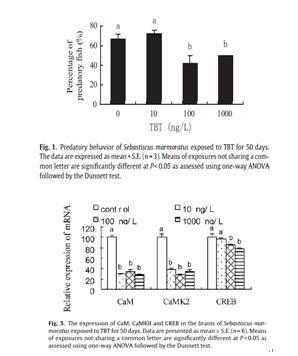Ang Yu, Xinli Wang, Zhenghong Zuo, Jiali Cai,
Chonggang Wang.Aquatic Toxicology, 2013. 128-129: 158-162.
Tributyltin (TBT) is a ubiquitous marine contaminant due to its
extensive use as a biocide, fungicide and antifouling agent. However, the
neurotoxic effect of TBT has not been extensively studied, especially in marine
fish. This study was conducted to investigate the effects of TBT (10, 100 and
1000 ng/L) on the predatory behavior of Sebastiscus marmoratus and to look into
the mechanism involved. The results showed that TBT exposure depressed
predatory activity after 50 days exposure. Dopamine levels in the fish brains
increased in a dose-dependent manner, while 5-hydroxytryptamine and
norepinephrine levels decreased significantly in the TBT exposure group
compared to the control. The mRNA levels of dopamine receptors, which have
functions such as cognition, motor activity, motivation and reward, mood,
attention and learning, were significantly down-regulated by TBT exposure.
Although the levels of amino acid neurotransmitters, including glutamate, did
not show marked alteration, the expression of the glutamatergic signaling pathway
such as N-methyl-d-aspartate receptors, a-amino-3-hydroxy-5-
methylisoxazole-4-propionic acid receptor, calmodulin, Ca2+/calmodulin-dependent
protein kinases-II and cyclic adenosine monophosphate responsive element
binding protein, was significantly reduced by TBT exposure, which indicated
that central nerve activities were in a state of depression, thus affecting the
predatory activities of the fish.

返回

